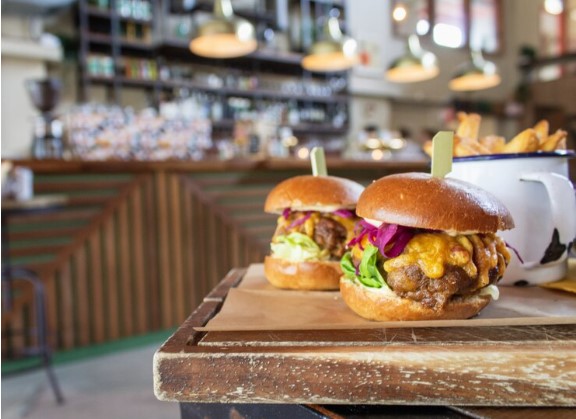Popularly known as the chips and chicken business in Kenya, quick-service restaurants are garnering massive profits in the food industry.
So, how can you establish a successful fast-food business in Kenya?
To start a fast food business, you will need an initial capital of Kshs 100,000 and above, depending on the location and size of your premises. Such a venture earns daily returns of Kshs 2,000 and above.
The demand for fast food continues to increase as the food market and restaurant delivery services record significant growth.
Why? After long hours of work, most Kenyans look for quick solutions since preparing meals takes a lot of time.
To help you open the best fast-food business in Kenya, I cover the following:
- What the fast food business entails
- Steps to start a fast food business in Kenya
- How to establish a profitable fast food business

Let’s take an inside look!
Fast Food Business In Kenya: What It Entails
What is a fast food business in Kenya?
Fast food business differs from country to country as what some states consider as carryout staples are different from other nations.
In Kenya, fast food businesses offer foods such as hotdogs, fries, chicken, sausages, samosas, shawarma, kebab, salads, cakes, and soft drinks. Advanced fast foods also provide a wider menu, including pizza, hamburgers, and ice cream.
How is the fast food business different from other food ventures?
Fast food businesses deal in quick meals, often referred to as junk food, while other food premises provide whole meals such as ugali, fish, and vegetables.
What Do You Need To Start a Fast Food Business?

You’ll require the following items to open a fast food business
- Refrigerator
- Deep fryers
- Cooker
- Shelves
- Utensils
- Microwave
- Cooking stove
- Blender if you plan to provide blended juice
- Furniture
Steps To Open a Fast Food Business In Kenya

Opening a fast food business for the first time can be challenging as you’re not familiar with the legal and business essentials. Here are steps to help you start a fast food business
Step 1. Conduct a Market Research
Before you take a major business establishment action, you should conduct thorough market research. This initial step will help you identify opportunities and the existing competition. In addition, you are likely to discover what works and what doesn’t as you research other fast food business owners.
Some of the key factors you can examine through market research include the following:
- The highly demanded food types
- Budget
- Your target customers
- The best fast food business location
- The gaps in the market
Market research allows you access to essential information that would have instead taken you ages to find out on your own.
Step 2. Choose The Best Fast Food Business Location
Your fast food location determines the number of customers you receive and the profit margins you earn. When choosing a premises, here are factors you should consider
- Accessibility
How accessible is your business location? Your customers and staff should reach your fast food without any difficulties.
- Visibility
Nairobi CBD is known for many fast food joints. However, only those that are well-situated attract a massive audience. Of course, people will consider the prices, but your joint’s visibility is a great way to market your restaurant to both existing and first-time clients.
- Security
Theft can cost your business a fortune, as regular burglary eats up your profits. As a result, when choosing a business location, you must ensure you establish it in a secure area to avoid such unnecessary costs.
- Utilities
Water, electricity, and sanitation are crucial when running an eatery. Hence, you should choose a location with enough water, electricity, and other utilities, such as efficient sewer lines, to keep your business running seamlessly.
- Population Density
To establish a profitable small fast food business in Kenya, you should choose a strategic location with high foot traffic. You can ensure this by renting a space next to a college, mall, or office.
Step 3. Prepare a Fast Food Business Plan

A business plan gives your venture direction by outlining the following:
- Short and long-term business goals
- The initial costs
- The expected risks
- The advantages of running a fast food business
- The disadvantages of a fast food business
- Revenue projections
- Business strategies to accomplish your objectives
With this information, you can compete against your business rivals successfully and establish a profitable fast food venture.
Step 4. Register Your Fast Food Business In Kenya
To operate a fast food business in Kenya, you must follow the legal business registration process. To complete this step, you will need a unique brand name for your business, your ID, and your KRA PIN.
Visit the eCitizen portal online and apply for the business registration. This will take you a few minutes as it’s a straightforward process.
When choosing your business name, ensure it covers what you are dealing with, and people can easily tell what products to expect. This will help you market your business.
Step 5. Acquire Licenses For Fast Food Business In Kenya
Some business categories require several licenses, for instance, the food business. As a result, you must follow the legal requirements to operate your fast food restaurant smoothly with no interruption. Here are the licenses you should apply for to run a quick-service restaurant
- Single Business Permit
A single business permit costs Kshs 5,000 and above annually, depending on the size of your premises. You can get this document from your City Council.
- Food and Hygiene License
Is your food safe for human consumption? To prove your food is safe, you must apply for a food and hygiene license. Typically, a health officer will visit your premises to examine whether your space matches the required standards before certifying it.
- Food Handler’s Certificate
Similar to other food businesses, the authority must confirm you’re well-equipped to handle consumable products.
- Fire Safety Certificate
Fast food businesses rely highly on fire; thus, you must have a fire safety certificate. To get this document, a fire officer will visit your premises to check whether you have the necessary equipment, like fire extinguishers and fire exits, to mitigate a fire accident.
They will then provide you with a fire safety certificate, allowing you to operate your business.
First-time business owners risk early closures by ignoring some legal requirements. To avoid this, visit your county authority offices and enquire about other legal needs to ensure you are fully compliant with the law.
Step 6. Get Reliable Suppliers
Finding reliable produce suppliers can help you run your business smoothly while cutting on expenditure. Depending on your most highly-demanded food type, you can connect with a farmer to get produce at a cheaper price.
Step 7. Hire and Train Employees
The fast food business is a highly competitive sector; hence, it requires well-trained and top-performing individuals. As a result, you must hire self-driven individuals who are well-equipped with skills to run your business efficiently.
Some of the key qualities you should look out for include hygiene, time management, and hospitableness. You can also seek assistance from reputable hiring agencies if you need help to employ staff.
Step 8. Launch Your Fast Food Business In Kenya
Now that you have all the necessary elements in place, launch your fast food restaurant. You can welcome new customers through promotions or offers to have a taste of your foods for the first time. This will help you acquire a solid customer base, allowing you to grow your business.
How To Establish the Best Fast Food Business In Kenya

Building a profitable business can be an uphill battle, especially if your location poses stiff competition. Here are a few tips to help you gain competitive advantage
Tip 1. Provide Delivery Services
Kenyans are facing tight schedules and adapting to new working models like remote jobs. As a result, there is a rise in the demand for delivery services, which you can leverage to boost your business returns.
This might require a rider or two, depending on the number of customers you’re serving. However, do not feel limited to partnering with bodaboda owners; you can purchase your vehicles in the long run as your business grows.
Tip 2. Develop a Suitable Marketing Strategy
You need a marketing strategy to improve your business sales and returns. Depending on your budget and target market, you can employ different techniques, including promotions, discounts, and offers.
In addition, leverage your location’s Facebook groups to catch the attention of new customers. You should also have your page to update your clients on the different foods you’re introducing.
Feel free to ask for professional assistance from marketing experts.
Tip 3. Offer First-Rate Customer Service
Customers go back to businesses that prioritize them; hence, you should hire staff that understand the importance of excellent customer service. Whether your customers need their fries crunchy or wet chicken stew, ensure you provide satisfactory services.
Again, you will receive complaints from customers from time to time. When this happens, applying diplomacy and emotional intelligence to solve the issue amicably will make them feel valued when visiting your restaurant again.
Also Read:
- 11 Unique and Lucrative Business Ideas In Kenya
- How To Establish a Profitable Bakery Business In Kenya
Frequently Asked Questions
How Much Does It Cost To Start a Food Business In Kenya?
The initial capital for a food business in Kenya varies, depending on the type of venture and your location. For instance, selling chapati can cost you from Kshs 5,000, while opening a fast food restaurant will require Kshs 100,000 and above.
So, don’t feel limited by your budget. You can start small and expand your business in the long run.
How Much Is a Food License In Kenya?
The food license costs in Kenya are as follows
- A single permit for a small food joint of up to 10 people is Kshs 4,000
- A single permit for a medium restaurant is Kshs 4,000
- A single business permit for a large restaurant is Kshs 6,000
Note that these values vary with county and government updates over time. So, ensure you confirm the current license pricing with your county authorities.
Ready To Start a Fast Food Business In Kenya?
After learning the requirements of a fast food business, you have an estimated budget for your business and a list of essential items. This will help you kickstart your venture to accomplish financial goals.
Need more money-making and management insights? Visit our store for expert guides and coaching.







